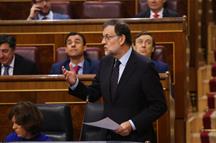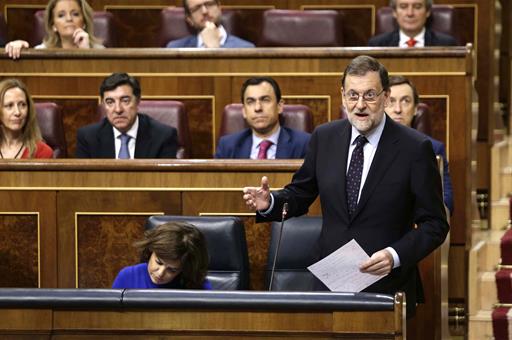"My obligation is to govern and work towards consolidating economic recovery, growth and job creation in Spain", says Mariano Rajoy
President's News - 2017.6.21
Lower House of Parliament, Madrid
In response to the MP from Compromís, Joan Baldoví, who asked the President of the Government if he intends to stand down, Mariano Rajoy stressed that "his obligation is to govern and work towards consolidating economic recovery, growth and job creation in Spain".
According to the President of the Government, there are three reasons why he should continue to head up the government. Firstly, because his party, the PP [People's Party], is the formation that "has the largest number of seats" in the Lower House (137; the second largest party has 85). Secondly, only seven months have gone by since the investiture. Lastly, the Lower House rejected the motion of no confidence presented against the government just a week ago.
Mariano Rajoy added that, since this is an issue of both the democracy and responsibility, "it is only logical and reasonable that I meet my obligation".
Fiscal regularisation
Margarita Robles, Spokesperson for the PSOE [Spanish Socialist Workers' Party] in the Lower House, asked for the government's assessment of the Constitutional Court ruling on the fiscal regularisation of 2012. Mariano Rajoy, after explaining that he does not assess the rulings handed down by the courts, but rather limits himself to complying with them, clarified that the Constitutional Court has only rejected "the procedure used" for this regularisation. Moreover, the President of the Government added that the Constitutional Court made it clear that "the ruling will have no effects" and that "the actions taken, which are binding, cannot now be revised".
The President of the Government recalled the circumstances in which the government took this decision. "At that time, Spain was in a critical situation, on the verge of bankruptcy and a bailout". Among other things, the public deficit, left by the Socialist Government, stood at 9.6%, and 70 billion euros had been lost in tax revenue.
Against this backdrop, pointed out Mariano Rajoy, the government took "decisions that it probably would not have taken if the circumstances had been different". The President of the Government also pointed out that 1.2 billion euros were collected from the fiscal regularisation and 40 billion euros were uncovered that began to be levied, which had not happened under the previous regularisations exercised when the socialists were in power.
Mariano Rajoy also underlined that "the fiscal regularisation neither wipes out nor pardons criminal offences".
Ruling in the Atutxa Case
 Pool Moncloa/J.A. RamosThe representative of the Basque Nationalist Party, Aitor Esteban, referred to the ruling handed down by the ECHR in the Atutxa Case. In response to his question, Mariano Rajoy once again stated that "I have to respect and comply with the rulings handed down by the courts, whatever they may be, whether they back me or not".
Pool Moncloa/J.A. RamosThe representative of the Basque Nationalist Party, Aitor Esteban, referred to the ruling handed down by the ECHR in the Atutxa Case. In response to his question, Mariano Rajoy once again stated that "I have to respect and comply with the rulings handed down by the courts, whatever they may be, whether they back me or not".
The President of the Government pointed out that the ECHR has ruled in favour of Spain on some occasions (on outlawing Batasuna and on the distribution of terrorist prisoners around the country, for example) and against Spain on others (on the so-called Parot doctrine).
In the Atutxa Case (in 2008, three members of the Board of the Regional Parliament of the Basque Country refused to dissolve the Batasuna parliamentary group after it was outlawed as a political force), the ECHR did not hand down a ruling on the heart of the matter, but rather considered that "the defendants should have been interrogated as witnesses before the Supreme Court".
At any event, Mariano Rajoy highlighted that "Spain is the fourth ranked country in terms of fewest actions brought against it before the ECHR", which shows "the capacity and competence of the Spanish courts".





